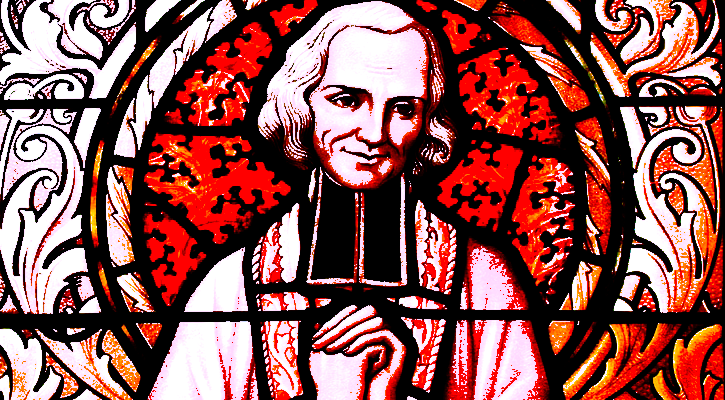
The thought of the Curate d’Ars on the Works of Mercy
Embodying Divine Love: The Curé of Ars’ Profound Insights into the Works of Mercy
The Curé of Ars, also known as Saint John Vianney (1786-1859), was a French Catholic priest renowned for his holiness and pastoral commitment. His thoughts on the works of mercy reflect his profound spirituality and dedication to serving others.
The Curé of Ars regarded the works of mercy as tangible expressions of God’s love for humanity. He taught that every act of mercy was a way to respond to divine love and, in doing so, draw closer to God. He saw the works of mercy as the practical embodiment of the Gospel, a means to live out Jesus’ message in everyday life.
One of the Curé of Ars’ main teachings was that the works of mercy should not only manifest as external actions but also stem from a generous and loving heart. He encouraged practicing charity not only towards those who were prominent or who treated us well but also towards those who might seem difficult or unjust. This required genuine inner conversion, transforming one’s attitude towards others.
The Curé of Ars placed particular importance on the spiritual works of mercy, such as consoling the afflicted, forgiving enemies, and praying for the living and the dead. He viewed these actions as a testament to Christ’s compassion and His desire to heal the wounds of the soul. Furthermore, he emphasized that the works of mercy should not be done to earn human approval but rather for the pleasure of God.
His own life was an extraordinary example of dedication to the works of mercy. He spent long hours in the confessional, listening and comforting penitents. He fed the poor and provided hospitality to travelers. His actions were rooted in deep prayer and his intimate union with God.
In conclusion, the Curé of Ars’ thoughts on the works of mercy present a passionate call to embody Christ’s love in the world through concrete actions and a spirit of compassion. His testimony continues to inspire people to live out their faith authentically, serve others with a generous heart, and see the works of mercy as a path towards holiness. His legacy reminds us that embracing the works of mercy can lead us to a deeper understanding of God’s mercy and a more profound connection with our fellow human beings.
The life of Saint John Mary Vianney
Saint John Mary Vianney, also known as the Curé of Ars, led a remarkable and inspiring life characterized by his deep spirituality, pastoral dedication, and unwavering commitment to serving God and his community. Born on May 8, 1786, in Dardilly, France, he overcame various challenges to become one of the most beloved and revered figures in the history of the Catholic Church.
Vianney’s early life was marked by the tumultuous aftermath of the French Revolution, which disrupted his education and delayed his entrance into the priesthood. Despite these obstacles, his strong desire to serve God led him to persevere, and he was eventually ordained a priest on August 13, 1815. He was assigned to the remote village of Ars, where his transformative journey truly began.
Throughout his years in Ars, Vianney dedicated himself wholeheartedly to his pastoral duties. He is perhaps best known for his tireless work in the confessional, where he spent up to 18 hours a day hearing confessions, offering guidance, and providing solace to the countless individuals who sought his counsel. His ability to discern the innermost thoughts and feelings of penitents earned him a reputation as a “wonderworker of the confessional.”
Vianney’s teachings centered on the importance of repentance, prayer, and devotion to the sacraments. He emphasized the significance of the Eucharist and encouraged frequent reception of Holy Communion. He also advocated for the power of prayer and believed that a strong prayer life was essential for cultivating a deeper relationship with God.
Despite facing personal challenges and spiritual trials, Vianney remained steadfast in his commitment to his vocation. He embraced a life of poverty and simplicity, often giving away his own possessions to those in need. His humility and genuine care for others endeared him to his parishioners and attracted pilgrims from far and wide.
Vianney’s impact extended beyond his parish, as news of his holiness and miracles spread throughout France. He became a sought-after spiritual advisor and confessor, and his insights into the human heart and soul were sought by people from all walks of life.
Recognizing his extraordinary virtue and profound influence, Pope Pius XI canonized John Mary Vianney as a saint on May 31, 1925. His feast day is celebrated on August 4th, a day dedicated to honoring his legacy and contributions to the Church.
In summary, the life of Saint John Mary Vianney exemplifies the transformative power of a life devoted to God and others. His dedication to the priesthood, his unwavering commitment to the sacraments, and his deep compassion for the spiritual well-being of his fellow human beings continue to inspire countless individuals to seek holiness, embrace their vocations, and cultivate a life of prayer and service.
